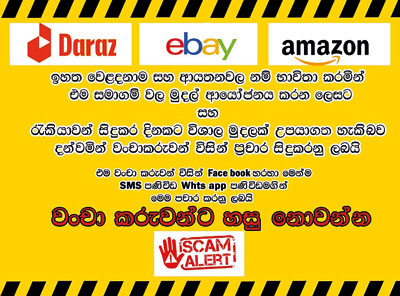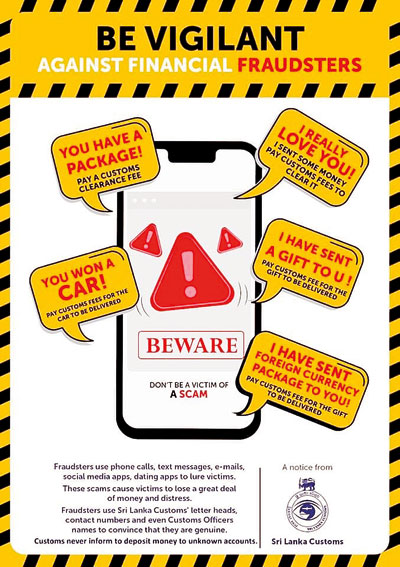News
‘Gift’ packages used as bait for large-scale ripoffs
View(s):By Renishka Fernando
A spate of recent financial frauds carried out using information related to Sri Lanka Customs has led to Customs issuing warnings.
However, according to Customs Director General and media spokesperson Seevali Arukgoda, these frauds are not new. “To my knowledge, this has been happening for over three years now,” he said.
Customs letterheads, telephone numbers, and officials’ names are being used to commit these frauds. Mr. Arukgoda remarked that con artists contact potential victims via Facebook and pursue either a friendship or a romantic relationship with them. After a few months, the fraudsters inform the victims that they are sending them gifts or packages, which they must claim from Customs.

The fraudsters promise valuable jewellery, foreign currency, and designer items to lure the victims into depositing money to claim these gifts. The victims are asked to maintain extreme secrecy as the goods are valuable and any knowledge regarding them runs the risk of being lost. The con artists ask these individuals to deposit money in a local account.
“There are local people operating these schemes here,” Mr. Arukgoda said. A specific date is chosen by the con artists, and then the victims are first asked to deposit less than Rs 100,000 before or within that day. Then they keep asking for more money by mentioning additional charges like transport costs and clearance charges. Individuals keep depositing money because, from their perspective, they are receiving a far more valuable exchange. Once the money is deposited, the con artists withdraw the money and disappear without a trace.
When the victims try to contact the numbers or accounts through which they were contacted, they are met with error messages about accounts not existing or numbers being invalid.
Customs has a process for depositing money to receive items sent from abroad. Firstly, a declaration needs to be submitted. Then an assessment is conducted by Customs to determine the amount to be paid for the clearance of the package. The money should then be deposited with the Director General of Customs. Sri Lanka Customs does not accept money in individual accounts. Due to this lack of knowledge, individuals get caught up in these frauds.
“These con artists are using the newest technology to trap their victims,” said a Colombo Division Fraud Bureau official. They send a link that provides the victim with details about the package, such as the courier company and the tracking of the package delivery. This serves as an independent verification link for the gifts. They also use fake numbers, which show the caller the contact numbers of customers, tricking them into thinking that the gifts or packages are genuine.

Frauds with values of Rs 1 million to Rs 25 million are investigated by the regional fraud bureau in the area where the fraud occurred. Frauds below Rs 1 million are investigated by the Sri Lanka Police and the Special Crime Investigation Bureau. However, a complaint must be filed.
“One of the main reasons that these con artists are successful is the ignorance of their victims,” noted the official from the Fraud Bureau. People must always be vigilant, he said, urging them to check with Customs regarding payments for packages before depositing money.
“If we are to completely eliminate fraud and corruption, political will and implementation are necessary,” emphasised Dr. Udayasri Kariyawasam, the president of the Sri Lanka Chapter of the Association of Certified Fraud Examiners. Sri Lanka has anti-corruption laws and systems in place to deal with these kinds of scams; however, fraud persists because laws are not enforced.
While any individual can open a bank account, the problem lies in the bank’s inability to verify the details provided by the customer. Banks have a Know-Your-Customer (KYC) form, but banks depend on the information provided by customers. “When con artists open these accounts or engage in transactions, they don’t reveal their true intentions,” noted Dr. Kariyawasam. The Association of Certified Fraud Examiners has raised awareness about fraud, corruption, and bribery through its work.
“These scams are difficult to eliminate; as soon as one is caught, another emerges,” said police media spokesman Senior Superintendent Nihal Thalduwa. Although investigations are conducted, it takes time to trace these individuals, he said.
The best way to say that you found the home of your dreams is by finding it on Hitad.lk. We have listings for apartments for sale or rent in Sri Lanka, no matter what locale you're looking for! Whether you live in Colombo, Galle, Kandy, Matara, Jaffna and more - we've got them all!

